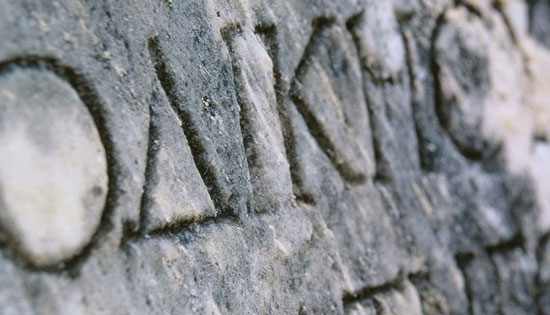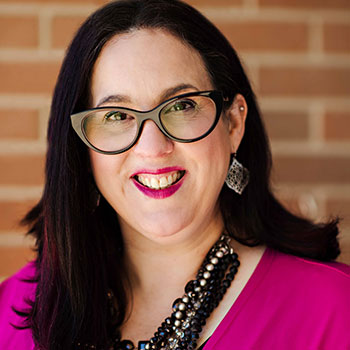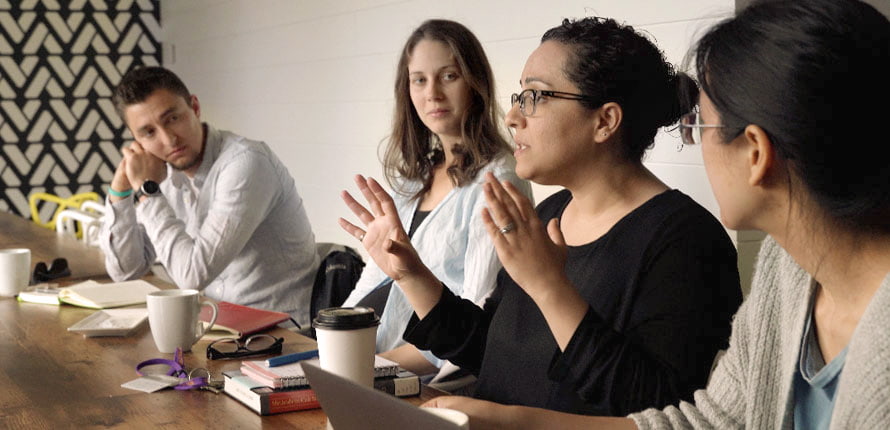Search for academic programs, residence, tours and events and more.
Our PhD in History program is part of the Tri-University Graduate Program in History, a partnership of Laurier, the University of Waterloo and the University of Guelph. This collaboration makes it possible for you to access the scholarship and experience of more than 65 graduate faculty and the resources of three universities.
The integration of history departments makes this program one of the biggest graduate history programs in Canada, while retaining the small classes and supportive student-professor relationships associated with History at Laurier.

Small PhD seminars; five students or fewer.
Wide variety of faculty supervising different geographic, thematic and temporal fields.
Guaranteed funding for four years of full-time study.
This program is designed so that it can be completed in four years of full-time study. It consists of a mixture of seminar courses, presentations, examinations, and student instructional opportunities. These milestones keep you in intimate contact with your committee, incorporating feedback into every stage of the program.
You must complete a:
Students generally participate in three field seminars in their first year and sit their major field exam in their fourth term.
Faculty members are willing to supervise students in any of the following research areas:
Innovative features of our program include a first-year professional development seminar and a presentation of a portion of your dissertation in a colloquium setting.
Our program emphasizes teaching skills, and most eligible doctoral students have the opportunity in their fourth year to teach a course of their own, with mentorship from a faculty member.
"Support for professional development was the key to my experience at Laurier: students are welcome to present at the Tri-University History Conference, which is a collegial place for new scholars to present their research alongside established researchers."
Lianne Leddy (BA '05, PhD '11), assistant professor, History, Wilfrid Laurier University
Take the first step in your graduate education and apply to one of our graduate programs. Follow our three-step admission process — we’ll walk you through how to apply and prepare for your first day as a graduate student.
After you have submitted your OUAC application, paid the non-refundable application fee, and Laurier has received your application, you'll receive an email from gradadmissions@wlu.ca advising you to upload the additional required documentation to Laurier’s Online Registration and Information System (LORIS).
Please note, the application process and the uploading of supplemental documentation, which includes references, typically takes two weeks. To avoid disappointment, apply early.
An application for admission to the PhD program in History must include:
Visit our Graduate Admissions Toolkit for more information about applying.
The Department of History welcomes international students to the PhD Program. International students who have confirmed funding from a third-party, such as their employer or a scholarship program in their home country, will be considered for admission.
Learn more about admission requirements for international applicants.Proficiency in written and spoken English is essential to graduate studies at Laurier. Applicants whose language of instruction during their previous postsecondary education was not in English must submit evidence of proficiency in English. If applicable, results from accepted testing services must be uploaded to LORIS.
Questions? Contact Susan Neylan, graduate coordinator, at sneylan@wlu.ca or 548.889.5058. For general inquiries, contact Erin Campana, office administration coodinator, at history@wlu.ca or 548.889.3717.

"Immerse yourself in all Laurier has to offer while completing your graduate education. Enjoy the journey – remember to have fun too!"
Paula C. Fletcher, associate dean, Faculty of Graduate and Postdoctoral Studies
Regardless of the type of graduate degree program you intend to pursue, financial planning is important. At Laurier, we want to provide you with as much information as possible about a variety of scholarship and funding opportunities and equip you with the skills to manage your finances effectively in the years to come.
Laurier welcomes international applicants to all of our doctoral programs. International students who have confirmed funding from a third-party, such as their employer or a scholarship program in their home country, will be considered for admission. Learn more about admission requirements for international applicants.

Graduates of our program have pursued successful careers in higher education, teaching, government and the private sector.
ASPIRE is Laurier's professional skills development training program for graduate students. The program helps you craft an individualized, extracurricular learning plan tailored to your professional journey and entry to the workplace.
Learn about the interests of our faculty members. For assistance in identifying an appropriate supervisor, contact a member of our team.
Gavin Brockett
Associate Professor
Coordinator, Muslim Studies Option
Vice-Dean of Arts
Tarah Brookfield
Professor
Blaine Chiasson
Associate Professor
Adam Crerar
Associate Professor
Darryl Dee
Associate Professor
Jeff Grischow
Professor
Associate Director, Tshepo Institute for the Study of Contemporary Africa
Mark Humphries
Professor
Rob Kristofferson
Professor
Sofie Lachapelle
Professor
Dean of Arts
Lianne Leddy
Associate Professor
Amy Milne-Smith
Professor
Darren Mulloy
Professor
Susan Neylan
Professor
Graduate Officer
Chris Nighman
Professor
Eva Plach
Professor
Chair, Department of History
David Smith
Associate Professor
Kevin Spooner
Professor, North American Studies
Director, Laurier Centre for the Study of Canada
Dana Weiner
Associate Professor